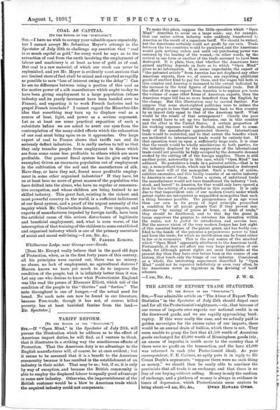COAL AS CAPITAL
[TO THE EDITOR OF THE "SPECTATOR:1
have no wish to occupy your valuable space repeatedly, but I cannot accept Mr. Sebastian Meyer's attempt in the -Spectator of July 25th to challenge my assertion that "coal is as much capital as gold," for every word he says as to the extraction of coal from the earth involving the employment of labour and machinery is at least as true of gold as of coal. But coal is a raw material, of which our stock can never be replenished, and yet Mr. Meyer is evidently most anxious that our limited store of fuel shall be mined and exported as rapidly as possible to save "loss of interest owing to the delay"! Can he see no difference between using a portion of this coal as the motive power of a silk manufacture which ought to-day to have been giving employment to a large population (whose industry and its yearly increment have been handed over to France), and exporting it to work French factories and to propel French ironelads ? I cannot regard the Micawber-like idea that something may turn up to displace coal as a source of heat, light, and power as a serious • argument. Let us at least see some practical exposition of such a substitute before we are asked to avert our eyes from the contemplation of the many-sided effects which the exhaustion of our coal must bring upon us as it approaches. Our large export of coal to France shows that tariffs can and do seriously deflect industries. It is really useless to tell us that they only transfer people from employment in those which are from some cause less profitable to others which are more profitable. Our present fiscal system has (to give only two examples) driven an enormous population out of employment in the cultivation of the soil and the manufacture of silk. Have they, or have they not, found more profitable employ- ment in some other organised industries ? If they have, let us at least hear no more of great masses of the population who have drifted into the slums, who have no regular or remunera- tive occupation, and whose children are being trained to no skilled industry. This great fact, existing in the richest and most powerful country in the world, is a sufficient indictment of our fiscal system, and a proof of the urgent necessity of the inquiry which Mr. Chamberlain demands. Free imports, and exports of manufactures impeded by foreign tariffs, have been the artificial cause of this serious disturbance of legitimate and beneficial employment, and, what is even worse, of the interruption of that training of the children to some established and organised industry which is one of the primary essentials of social and moral well-being.—I am, Sir, &c.,
W. FARBER ECROYD.
Whit barrow Lodge, near Grange-over-Sands.
[Does Mr. Eeroyd really believe that in the good old days of Protection, when, as in the first forty years of this century, all his principles were carried out, there was no misery, no slums, no lack of employment, no agricultural distress ? Heaven knows we have yet much to do to improve the condition of the people, but it is infinitely better than it was. Let any one who desires to know what Protectionist England was like read the poems of Ebenezer Elliott, which tell of the condition of the people in the "thirties" and "forties." The note throughout is one of hunger,—of the actual need for bread. No such note can now be found in our literature, because Free-trade, though it has not, of course, killed poverty, has at least banished famine from the land.— ED. Spectator.]






































 Previous page
Previous page